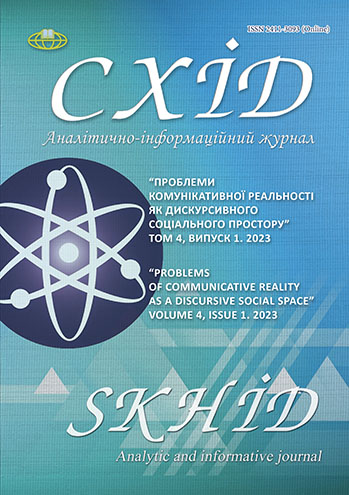Network Strategies in the Discourse of Education: Advantages, Disadvantages, Prospects
DOI:
https://doi.org/10.21847/2411-3093.2023.4(1).276454Keywords:
information society, Internet, educational space of higher education institutions, student’s personality, distance learning, digital educationAbstract
The article summarizes the theoretical and methodological basis of transformation of the modern educational space from the standpoint of subordination to such goals of information society as the improvement of “human capital” and the education of an “informational person,” the formation of a “knowledge economy,” and the formation of a new paradigm of interpersonal communication. In the context of the specified goals, the specifics of development of the educational space in information society and the decisive role of the Internet technology in this process were investigated. The role of remote digital education is outlined and the ambivalence of its influence on the student’s personality in the discourse of education (self-education) and upbringing is substantiated. It has been proven that both its advantages and disadvantages arise not only from the peculiarities of the Internet technology, but also from the anthropological peculiarities of the perception of information on the Internet. Its mostly positive educational and mostly negative ethos potential is systematized. The security mission of the Internet is extremely valuable, which is confirmed by the examples of the recent Covid-19 pandemic and the current educational situation in Ukraine under the conditions of war.
Downloads
References
Abakumova, O.(2016). Filosofska refleksiya fenomena dystantsiynoyi osvity: [avtoref. dys. kand. filos. Nauk, Nats. ped. un-t im. M. P. Drahomanova] Electronic Dragomanov Ukrainian State University Repository http://enpuir.npu.¬edu.ua/handle/123456789/14257 (In Ukrainian)
Barlow, J. (1996, February 8). A Declaration of the Independence of Cyberspace. Davos, Switzerland. Electronic Frontier Fondation https://www.eff.org/cyberspace-independence.
Blended learning: how to organize a quality educational process in the conditions of war (2022). Ministry of Education and Science of Ukraine. https://goo.su/vp3D0c.
Ferhyuson, N.(2020). Hlobalnyy zanepad. Yak pomyrayut instytuty ta ekonomiky. Kyiv, Nash format. (In Ukrainian)
Fuks, H. (2019. 11. 25). Smartfonozalezhnistʹ: na yakiy stadiyi perebuvayete vy? Deutsche Welle https://goo.su/uJjLYZ . (In Ukrainian)
Horbunova, L. (2011). Nomadyzm yak sposib myslennya ta osvitnya stratehiya. Filosofiya osvity. № 1-2(10), 17-33 (In Ukrainian)
Ishchuk, N. (2013). Antropolohichni aspekty internet-komunikatsiy. Visnyk Natsionalʹnoho aviatsiynoho universytetu. Filosofiya. Kulturolohiya, № 1, 26-30. (In Ukrainian)
Ivantsiv, A. (2020). Zalezhnistʹ vid lyudsʹkosti. Yak shkola spravlyayetʹsya z vyklykamy karantynu ta onlayn-osvity? LB.ua. https://lb.ua/society/2020/05/01/456533_zalezhnist_-vid_lyudskosti_yak_shkola.html (In Ukrainian)
Lenem, R. (2005). Elektronne slovo: demokratiya, tekhnolohiya ta mystetstvo. Chelovek i novye ynformatsyonnye myry. Seriya “Zmina paradyhmy”. Kyiv, Vydavnytstvo ‘Nika Tsentr’.(In Ukrainian)
Luman, N. (2010). Realnist mas-media. Kyiv, TSVP. https://findbook.in.ua/books/rieal-nist-mas-miedia. (In Ukrainian)
Nikols, T. (2019). Dyvuvanni ekspertyzi. Yak neobmezhenyy dostup do informatsiyi robytʹ nas tupishymy. Kyiv, Nash format, (In Ukrainian)
Newport, C. (2018). Ne turbuvaty! Yak sfokusuvatysya v informatsiynomu shumi. Kyiv : Nash format. (In Ukrainian)
Orhanizatsiya Obyednanykh Natsiy : veb-sayt. (2020.09.29). https://www.un.org/ru/.
Semenchenko, N.(2010). Obrazovanye v Ukrayne. Kyiv, Sammit-knyha. (In Ukrainian)
Tverezovska, N. (2012). Rolʹ i mistse sotsialʹnykh merezh u formuvanni osvitnʹo-informatsiynoho seredovyshcha ahrarnykh universytetiv. http://nbuv.gov.ua/UJRN/nvnau_-ped_2012_175(3)__42. (In Ukrainian)
Toffler, E. (2000). Tretya khvylya. Kyiv, Vydavnychyy dim “Vsesvit”. (In Ukrainian)
Vasiuk, I.(2021). Sotsialna adaptatsiya osobystosti studenta v period suspilnykh transformatsiy: filosofskyy analiz [avtoref. dys. kand. filos nauk, Universytet Hryhoriya Skovorody], Bogomolets National Medical University Repository http://ir.librarynmu.com/bitstream/123456789/5117/1/avtoref_Vasyuk.pdf. (In Ukrainian)
Wiener, N. (1954). The Human Use of Human Beings: Cybernetics and Society Summary. https://wikisum-maries.org/the-human-use-of-human-beings-cybernetics-and-society/
Zharkivska, I. (2016). Teoriya pokolinʹ i upravlinnya personalom orhanizatsiyi (p.118-120). Ternopil, TNEU. http://surl.li/fgzxm (In Ukrainian).
Sim milʹyoniv ditey viyny v Ukrayini (24.02.2023). Ministry of Education and Science of Ukraine https://saveschools.in.ua/.(In Ukrainian)
Downloads
Published
How to Cite
Issue
Section
License
Copyright (c) 2023 Наталія Іщук , Ірина Васюк

This work is licensed under a Creative Commons Attribution-NonCommercial-NoDerivatives 4.0 International License.
1. Authors bear responsibility for the accuracy of facts, quotations, numbers and names used.
2. Manuscripts are not sent back.
3. The publisher does not always agree with the authors' opinion.
4. The authors reserve the right to authorship of the work and pass the first publication right of this work to the journal under the terms of a Creative Commons Attribution-NonCommercial-NoDerivatives 4.0 International License. This license allows others to distribute (copy) the published work for non-commercial purposes, provided there is mandatory attribution to its authors and a link to the first publication in our journal.
5. The authors have the right to conclude separate supplement agreements that relate to non-exclusive work distribution in the form in which it has been published by the journal (for example, to upload the work to the online storage of the journal or publish it as part of a monograph), provided that the reference to the first publication of the work in this journal is included.

